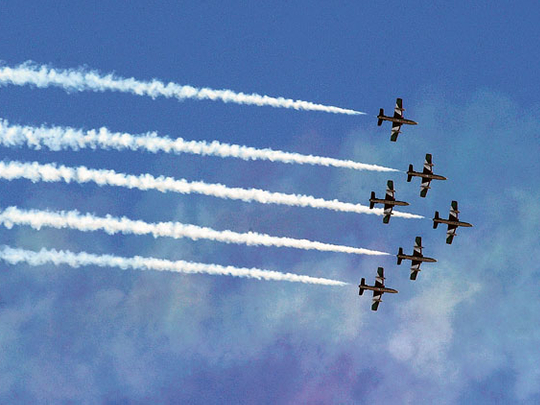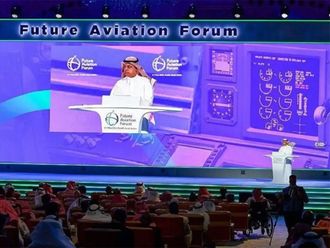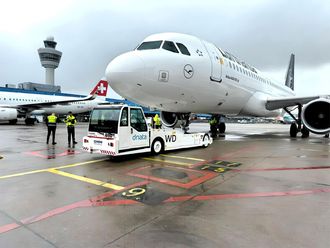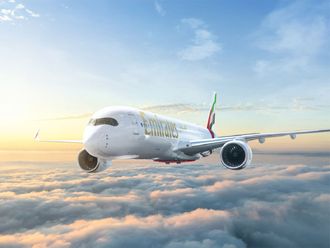
Dubai: The aviation industry has weathered turbulent times in the form of econ-omic gloom, volatile oil prices, volcanic eruptions, natural shocks in Japan, and lately, the Arab Spring.
The buying appetite of airlines seems to have returned with the airshow this year in contrast to 2009's show which was bereft of any major deal announcements because the world was in the grip of recession.
This year though, Emirates and Qatar Airways are expected to bring cheer back to the market as they prepare to announce some big aircraft deals during the show. As Shaikh Ahmad Bin Saeed Al Maktoum, President of Dubai Civil Aviation and Chairman and Chief Executive of Emirates airline and Group, recently said when asked about the possibility of orders at the air show: "It is more positive that we might sign something." The biggest Airbus A380 customer with 90 on order, Emirates recently expressed intentions to raise its superjumbo order to 120.
Qatar Airways chief executive Akbar Al Baker, meanwhile, recently told Gulf News that the airline has signed an order for additional A380 aircraft, with the deal's details due to be officially announced during the Dubai Airshow. The Doha-based carrier currently has five A380s on order.
"We ordered the A380s for a specific reason and we found the number we initially ordered to be insufficient. So we ordered a few more," Al Baker said.
As for the two aircraft-makers, the airshow will see both Boeing and Airbus locked in a potential order battle during the show as they try to secure potential business from the region.
The Gulf's biggest aviation event, which will last five days starting from Sunday, is ‘bigger and better' this time, says Alison Weller, managing director of organisers F&E Aerospace.
"With Emirates and Qatar Airways expected to make aircraft order announcements — as it has been heard — we sure expect some big deals to be signed," she recently told Gulf News.
Around 55,000 trade visitors are due to attend this year's airshow, which will have 1,000 exhibitors from 50 countries, according to the organisers.
Bigger and bolder
US aircraft-maker Boeing will be flying in its latest offering — the 787 Dreamliner to the Middle East for the first time during the airshow this year, according to the event's organiser. "Update - the Boeing 787 Dreamliner is coming to DXB; it's all booked in," read a Twitter message from F&B Aerospace.
Of the 820 plus aircraft on order by 55 airlines, Boeing's customers for the 787 in the Middle East include Qatar Airways, Gulf Air and Royal Jordanian. At present, Boeing has a backlog of 121 Dreamliners for the Middle East. Qatar Airways will be the first Middle East customer to receive the 787 in the middle of next year, a delivery long overdue.
New elements:
Outlining new activities for this year's airshow, F&E Aerospace said the show would offer new opportunities for participants to address key issues, create debate and highlight the UAE's achievements.
The three new initiatives developed include celebrating the UAE's 40th anniversary, ‘Futures Day', to be held on the last day of the airshow, in cooperation with Rolls-Royce as gold sponsor, and Boeing and Dubai Air Navigation Services (DANS) as silver sponsors, aimed at helping build the next generation of aviators; and the first-ever Gulf Aviation Training Event (GATE) — a conference aimed at bringing together recruitment policy-makers to find solutions to the looming shortage of flight crew in the Middle East.
In yet another first, the flying display will open with the UAE's own aerobatic team — Al Fursan — which will fly Alenia Aermacchi aircraft, to celebrate the country's 40th anniversary. The display will also feature the Patrouille de France aerobatic team, flying Alpha jets.
Like previous airshows, this year's event will also be the platform for state-of-the-art technical demonstrations and aircraft on the static park display, which will feature an F18, F15, C17, C-130J and an Apache MH-60 from the US besides an array of business jets from companies such as Gulfstream, Bombardier and Cessna.
Public display area for 2013 Airshow:
This year's air show will be the last to be held at Dubai Airport Expo, confirms Paul Griffiths, CEO of Dubai Airports. "The next Dubai Airshow would be held at the new premises at Dubai World Central-Al Maktoum International in 2013, and will for the first time likely include a public viewing gallery," he told Gulf News.
He added that the next airshow would be a far bigger event than the existing one as DWC offers a "flat canvas" and an opportunity to expand. "We might be able to include a public element in the next airshow, which has been missing so far at the existing facility at Dubai's Airport Expo," said Griffiths. He added that a one of the advantages of holding the airshow at DWC would also include having more participants due to a larger display area at the DWC site. "We have to be very restrictive as of now as Dubai International has fairly severe restrictions," Griffiths pointed out, adding that Dubai Airports is likely to make some announcements during the show this year.
Airport expansion: As airlines try to expand fleet, various new airport projects are taking shape across the region to support future growth, and a strong airport representation from across the Gulf Cooperation Council (GCC) at this year's show is a proof of that. According to recent research by Kuwait Financial Centre, GCC governments are planning investment in airport upgrading and expansion to the tune of $104 billion over the next few years, concentrated primarily in the UAE. Of this, the majority is earmarked for DWC-Al Maktoum International airport, with an estimated cost of $50 billion and due for completion by 2020.
"The story is not just one of global aspirations, but satisfying existing demand. Current capacity utilization in the GCC (Passengers/Capacity) stands at over 115 per cent; Bahrain has the most severe case of under-capacity, moving almost double its capacity in 2010. The UAE, which has seen massive airport expansions in recent years, is the only GCC country operating with some reserve," said M.R. Raghu, Head of Research at Kuwait Financial Centre.












